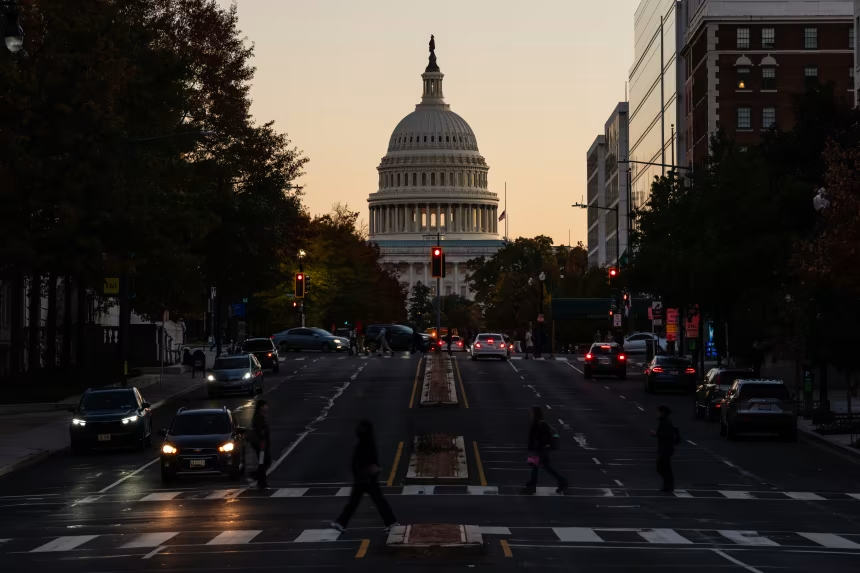Now Reading: Democrats Divided as Senate Deal Ends Longest U.S. Government Shutdown
-
01
Democrats Divided as Senate Deal Ends Longest U.S. Government Shutdown
Democrats Divided as Senate Deal Ends Longest U.S. Government Shutdown

A fractured Democratic Party helped pave the way for the U.S. government to reopen after the longest shutdown in American history, exposing deep divisions over health care policy and strategy against President Donald Trump.
The Senate reached a breakthrough late Sunday after a group of moderate Democrats dropped their key demand for a guaranteed extension of Affordable Care Act (ACA) subsidies, allowing a vote to move forward and end nearly six weeks of political paralysis.
Eight Democratic senators joined Republicans to advance the funding measure, which reopens the government until January 30 and restores pay for federal workers. The deal also reverses Trump’s firing of federal employees during the shutdown and extends food assistance through 2026.
However, the compromise has angered progressives who view it as a surrender. Senator Elizabeth Warren condemned the agreement as “a mistake,” insisting that Democrats should not have backed down without securing affordable health care protections. “We are in a health care emergency,” she wrote on X (formerly Twitter).
Vermont Senator Bernie Sanders called the deal “a policy and political disaster,” warning that caving to Trump would demoralize voters and embolden Republicans ahead of next year’s midterm elections.
The party’s leadership also appeared split. Senate Majority Leader Chuck Schumer voted against the deal, while his deputy, Senator Dick Durbin — who is retiring next year — supported it. Arizona Senator Ruben Gallego rejected the measure, saying Americans already burdened by inflation were now facing “crappy, overpriced” insurance plans due to lost ACA subsidies.
The rift within the party threatens to undermine its momentum following major wins in New Jersey, Virginia, and New York City’s recent elections — victories largely attributed to messaging around economic inequality and health care affordability. Analysts say the Democrats’ failure to secure a firm commitment on ACA subsidies may weaken their credibility on the issue, even as polls show most Americans blame Trump and Republicans for the shutdown.
Senator Tim Kaine of Virginia, one of the moderates who backed the deal, defended his decision, arguing that the compromise puts pressure on the GOP ahead of a December vote on health care subsidies. “If they don’t support it, voters will replace them with someone who will,” he said.
While Trump emerged without conceding to Democrats’ demands, his perceived indifference during the 40-day shutdown could carry political costs. Critics point to his absence during the Senate negotiations — he spent the weekend at his Florida resort after attending an NFL game — as evidence of detachment from the struggles of millions of Americans who went unpaid or lost benefits.
The president’s refusal to negotiate while the government was closed reinforced his “winner” persona among supporters but risked deepening resentment among voters affected by halted services and delayed paychecks. Republicans now face a difficult question: whether to allow the enhanced Obamacare subsidies to expire, a move that could make health care unaffordable for millions and prove politically disastrous ahead of the 2026 midterms.
The shutdown revealed both Trump’s stubborn dominance and the limits of his control. GOP senators defied his call to abolish the filibuster — a rule requiring 60 votes for most legislation — highlighting cracks in his influence within the party. Democrats, meanwhile, must confront a painful reality: with limited power in Washington, their only leverage was withholding votes in the Senate. While that strategy spotlighted the healthcare crisis, it also left millions suffering from a political standoff that achieved little immediate progress.
The government may have reopened, but the battle over America’s health care future — and the soul of the Democratic Party — is far from over.


